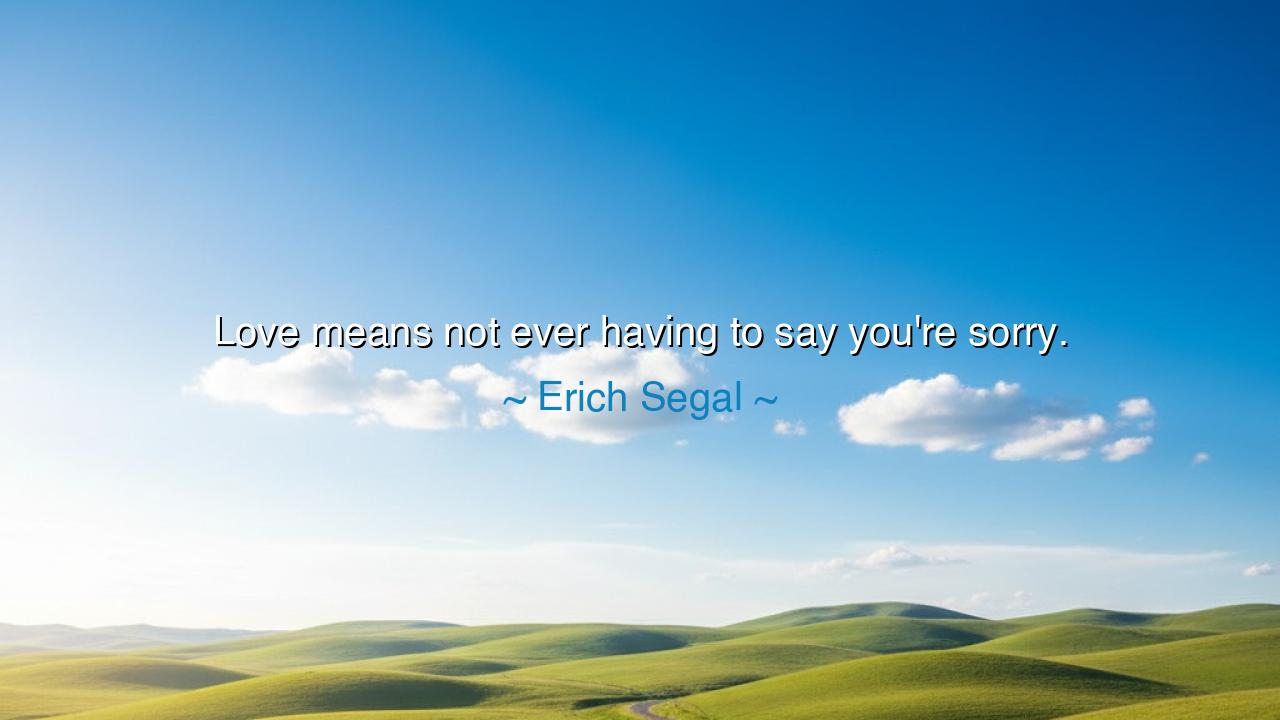
Love means not ever having to say you're sorry.






"Love means not ever having to say you're sorry." These words, spoken by Erich Segal in his iconic work Love Story, carry a profound truth about the nature of true love. At first glance, the sentiment may seem unusual—after all, saying you're sorry is often viewed as an essential part of reconciliation and mending relationships. Yet, Segal's words point to a deeper, more sacred truth about love: when love is pure and genuine, it transcends the need for apologies because the love itself becomes the forgiveness and the understanding that keeps the bond intact. In true love, there is no room for resentment or judgment, only a deep and unwavering acceptance of each other’s flaws.
In the ancient wisdom of the Greeks, love was seen not just as a fleeting feeling but as a force that binds souls together in unity. Plato, in his writings, explored the nature of love, which he called Eros, as a divine force that drives us toward our higher selves. True love, in this sense, was never about perfection but about the shared journey of two souls who see beyond each other's imperfections and choose to grow together. When love is based on deep mutual respect and trust, it is not about keeping score or demanding apologies, but about embracing each other’s imperfections and learning from the experiences shared. In this light, Segal’s quote becomes an expression of the idea that true love does not hold grudges—it elevates.
To understand this more deeply, consider the legendary relationship between Antony and Cleopatra, two figures whose love was as intense and transformative as it was tragic. Their bond, filled with both grandeur and sorrow, was not without its conflicts and challenges. Yet, in their love for one another, they found the strength to defy empires, to face untold hardships, and to join together in the pursuit of a shared destiny. Despite the pressures of the world around them, there was no room for apologies between them because their love was based on the profound understanding of each other’s essence. It was a love so deep that it saw beyond mistakes and flaws, instead focusing on the commitment and passion they shared. In this sense, their love was so powerful that it required no words of regret, for their union was built on a higher foundation—one of shared dreams and unspoken acceptance.
Similarly, the love between King Henry II of England and Eleanor of Aquitaine was marked by profound complexities. Though their relationship was strained at times by political and personal tensions, their enduring love remained steadfast. In their most difficult moments, there were no apologies—instead, they found ways to navigate their differences with mutual understanding and respect. Their love, much like that described by Segal, was not about perfection but about acceptance and the strength to continue, together. Even in the face of betrayal or hardship, the love they shared was powerful enough to transcend the need for constant reparations, because their connection was rooted in a deep and abiding trust.
Erich Segal’s words are not a dismissal of the need for responsibility in relationships, but rather a recognition of the deep connection that exists between two people who love each other truly and deeply. True love, in its purest form, creates an unspoken bond that requires no explanation or apology. It is not that mistakes are never made, but that love becomes the space in which mistakes are forgiven before they are even acknowledged. When two people love with all their hearts, they already understand each other’s flaws, and the love itself serves as a constant act of forgiveness. There is a grace that exists in true love, where apologies become unnecessary because the understanding and compassion between the lovers are so profound that nothing can truly disrupt the bond.
The lesson here is clear: true love is not about perfection, nor is it about the absence of mistakes. It is about embracing one another fully, with all the strengths and weaknesses that we bring to a relationship. In such love, there is no need to constantly apologize, because the love itself offers understanding, patience, and forgiveness. It is an act of grace, a willingness to accept each other’s flaws without judgment. It calls us to grow together, to learn from our missteps, and to support one another in the journey of life without the constant burden of needing to ask for forgiveness.
In our own lives, let us aim to love deeply—not with the expectation of perfection, but with the understanding that love is about acceptance. Let us strive to build relationships where we do not feel the need to apologize for every flaw, but instead create an environment of mutual support and growth. Love is not about keeping score or correcting every mistake; it is about fostering trust and compassion, knowing that even when we falter, we are held in the embrace of something far greater than our individual shortcomings. By embracing this unconditional love, we can create relationships that are both enduring and transformative—relationships where the need for apologies fades, replaced by the lasting power of understanding and acceptance.






AAdministratorAdministrator
Welcome, honored guests. Please leave a comment, we will respond soon